Leadership and Management Roles and Operational Management Analysis
VerifiedAdded on 2020/07/22
|16
|4486
|77
Report
AI Summary
This report examines the roles and characteristics of leaders and managers, contrasting their responsibilities and impact on organizational success, using Tesco PLC as a case study. It defines management and operations, emphasizing the conversion of inputs into outputs to meet customer needs. The report delves into the differences between leaders and managers, highlighting their distinct approaches to achieving business objectives. It explores how leadership and management roles apply in different situational contexts, providing insights into the functions of managers and the roles of leaders within the organization. The report also applies various leadership theories, such as situational and contingency theories, and models to the context of Tesco PLC, demonstrating their relevance in achieving business objectives. Finally, the report discusses business environmental factors that affect operational management and decision-making processes within the company.
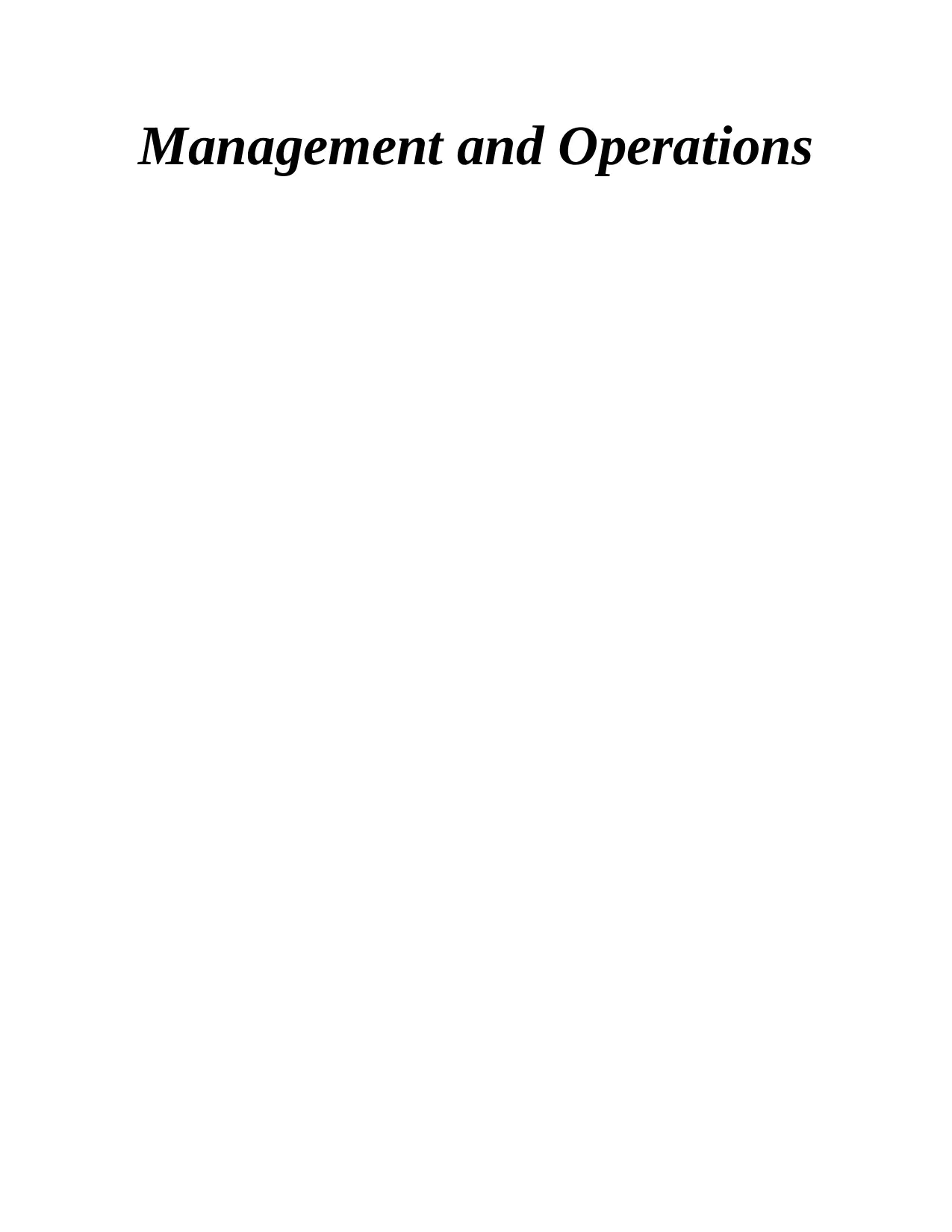
Management and Operations
Paraphrase This Document
Need a fresh take? Get an instant paraphrase of this document with our AI Paraphraser
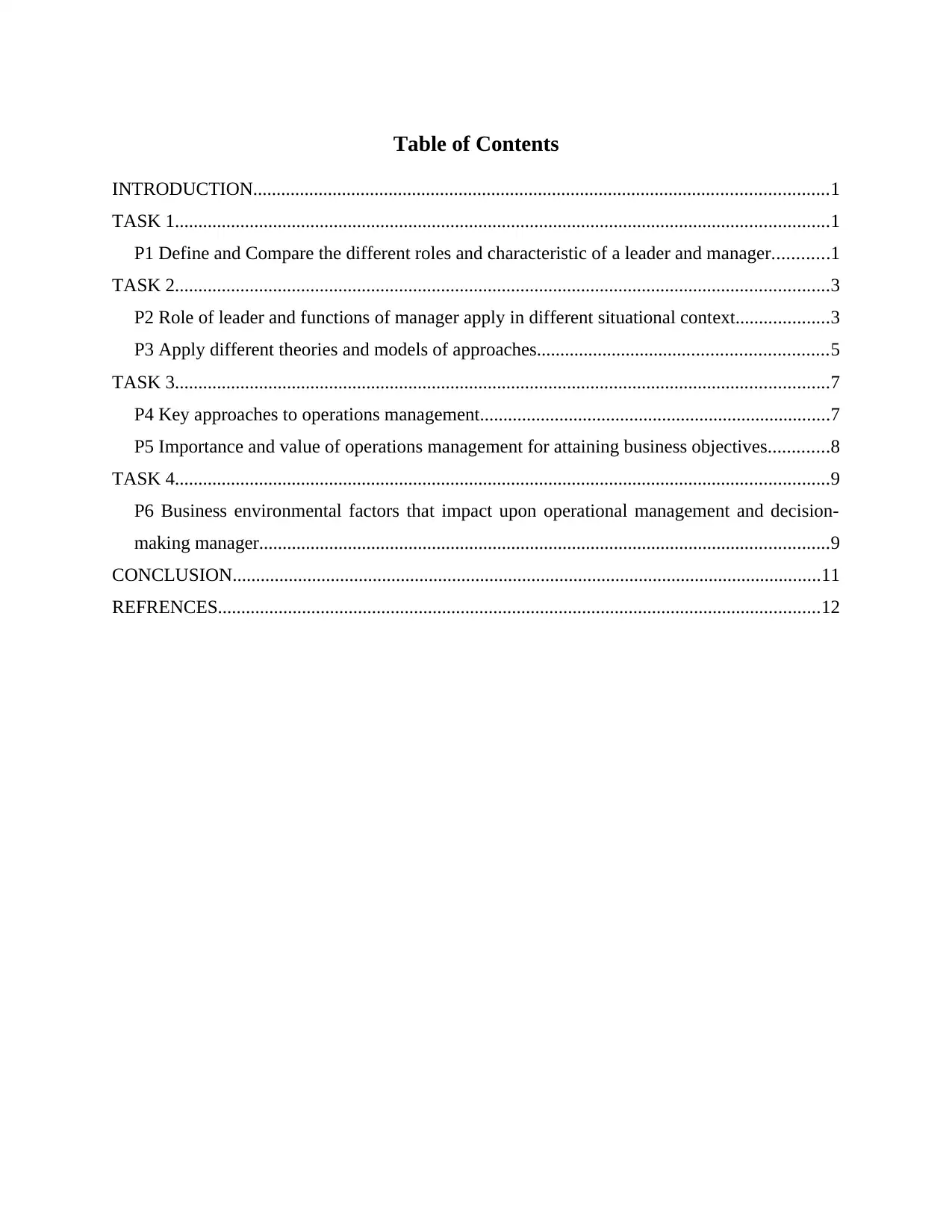
Table of Contents
INTRODUCTION...........................................................................................................................1
TASK 1............................................................................................................................................1
P1 Define and Compare the different roles and characteristic of a leader and manager............1
TASK 2............................................................................................................................................3
P2 Role of leader and functions of manager apply in different situational context....................3
P3 Apply different theories and models of approaches..............................................................5
TASK 3............................................................................................................................................7
P4 Key approaches to operations management...........................................................................7
P5 Importance and value of operations management for attaining business objectives.............8
TASK 4............................................................................................................................................9
P6 Business environmental factors that impact upon operational management and decision-
making manager..........................................................................................................................9
CONCLUSION..............................................................................................................................11
REFRENCES.................................................................................................................................12
INTRODUCTION...........................................................................................................................1
TASK 1............................................................................................................................................1
P1 Define and Compare the different roles and characteristic of a leader and manager............1
TASK 2............................................................................................................................................3
P2 Role of leader and functions of manager apply in different situational context....................3
P3 Apply different theories and models of approaches..............................................................5
TASK 3............................................................................................................................................7
P4 Key approaches to operations management...........................................................................7
P5 Importance and value of operations management for attaining business objectives.............8
TASK 4............................................................................................................................................9
P6 Business environmental factors that impact upon operational management and decision-
making manager..........................................................................................................................9
CONCLUSION..............................................................................................................................11
REFRENCES.................................................................................................................................12

⊘ This is a preview!⊘
Do you want full access?
Subscribe today to unlock all pages.

Trusted by 1+ million students worldwide
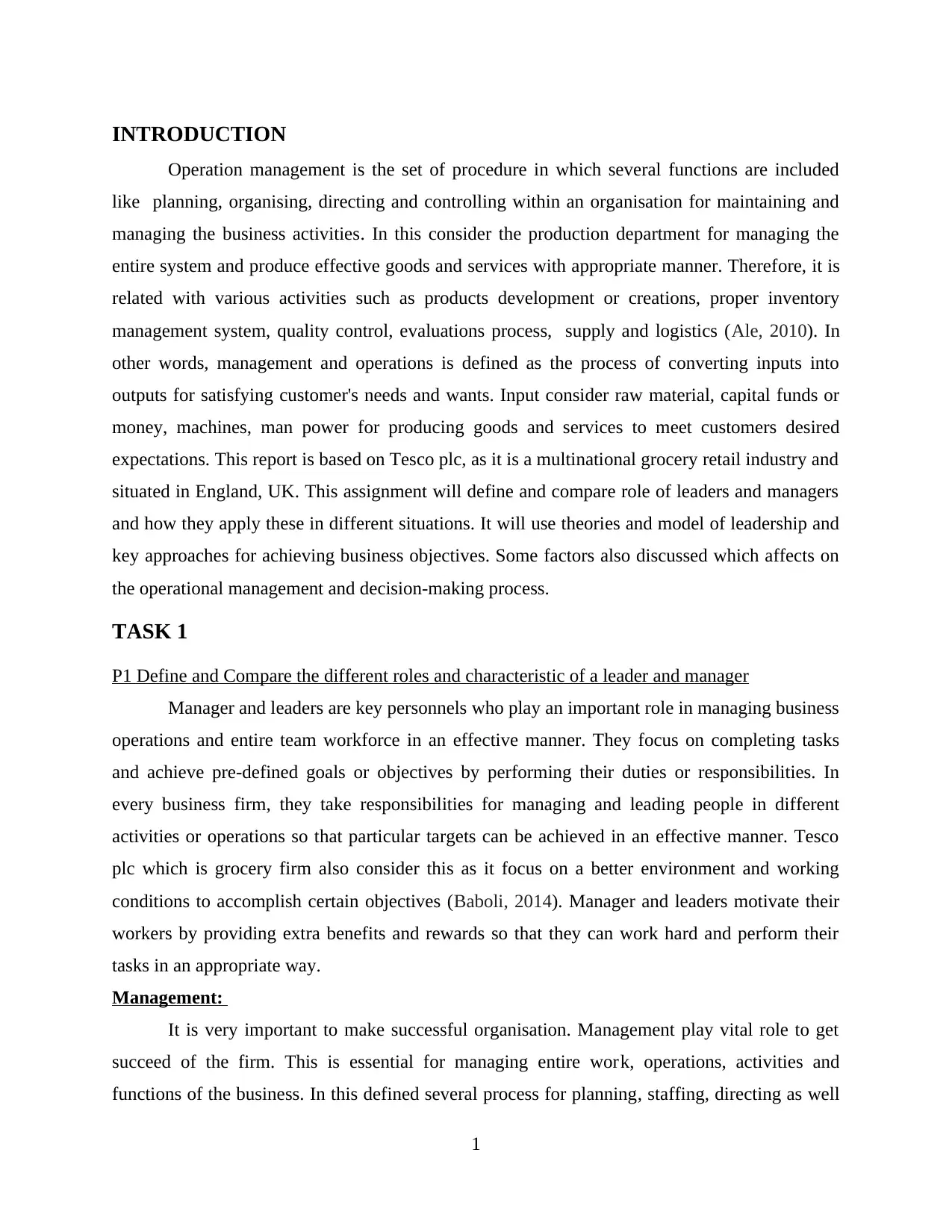
INTRODUCTION
Operation management is the set of procedure in which several functions are included
like planning, organising, directing and controlling within an organisation for maintaining and
managing the business activities. In this consider the production department for managing the
entire system and produce effective goods and services with appropriate manner. Therefore, it is
related with various activities such as products development or creations, proper inventory
management system, quality control, evaluations process, supply and logistics (Ale, 2010). In
other words, management and operations is defined as the process of converting inputs into
outputs for satisfying customer's needs and wants. Input consider raw material, capital funds or
money, machines, man power for producing goods and services to meet customers desired
expectations. This report is based on Tesco plc, as it is a multinational grocery retail industry and
situated in England, UK. This assignment will define and compare role of leaders and managers
and how they apply these in different situations. It will use theories and model of leadership and
key approaches for achieving business objectives. Some factors also discussed which affects on
the operational management and decision-making process.
TASK 1
P1 Define and Compare the different roles and characteristic of a leader and manager
Manager and leaders are key personnels who play an important role in managing business
operations and entire team workforce in an effective manner. They focus on completing tasks
and achieve pre-defined goals or objectives by performing their duties or responsibilities. In
every business firm, they take responsibilities for managing and leading people in different
activities or operations so that particular targets can be achieved in an effective manner. Tesco
plc which is grocery firm also consider this as it focus on a better environment and working
conditions to accomplish certain objectives (Baboli, 2014). Manager and leaders motivate their
workers by providing extra benefits and rewards so that they can work hard and perform their
tasks in an appropriate way.
Management:
It is very important to make successful organisation. Management play vital role to get
succeed of the firm. This is essential for managing entire work, operations, activities and
functions of the business. In this defined several process for planning, staffing, directing as well
1
Operation management is the set of procedure in which several functions are included
like planning, organising, directing and controlling within an organisation for maintaining and
managing the business activities. In this consider the production department for managing the
entire system and produce effective goods and services with appropriate manner. Therefore, it is
related with various activities such as products development or creations, proper inventory
management system, quality control, evaluations process, supply and logistics (Ale, 2010). In
other words, management and operations is defined as the process of converting inputs into
outputs for satisfying customer's needs and wants. Input consider raw material, capital funds or
money, machines, man power for producing goods and services to meet customers desired
expectations. This report is based on Tesco plc, as it is a multinational grocery retail industry and
situated in England, UK. This assignment will define and compare role of leaders and managers
and how they apply these in different situations. It will use theories and model of leadership and
key approaches for achieving business objectives. Some factors also discussed which affects on
the operational management and decision-making process.
TASK 1
P1 Define and Compare the different roles and characteristic of a leader and manager
Manager and leaders are key personnels who play an important role in managing business
operations and entire team workforce in an effective manner. They focus on completing tasks
and achieve pre-defined goals or objectives by performing their duties or responsibilities. In
every business firm, they take responsibilities for managing and leading people in different
activities or operations so that particular targets can be achieved in an effective manner. Tesco
plc which is grocery firm also consider this as it focus on a better environment and working
conditions to accomplish certain objectives (Baboli, 2014). Manager and leaders motivate their
workers by providing extra benefits and rewards so that they can work hard and perform their
tasks in an appropriate way.
Management:
It is very important to make successful organisation. Management play vital role to get
succeed of the firm. This is essential for managing entire work, operations, activities and
functions of the business. In this defined several process for planning, staffing, directing as well
1
Paraphrase This Document
Need a fresh take? Get an instant paraphrase of this document with our AI Paraphraser
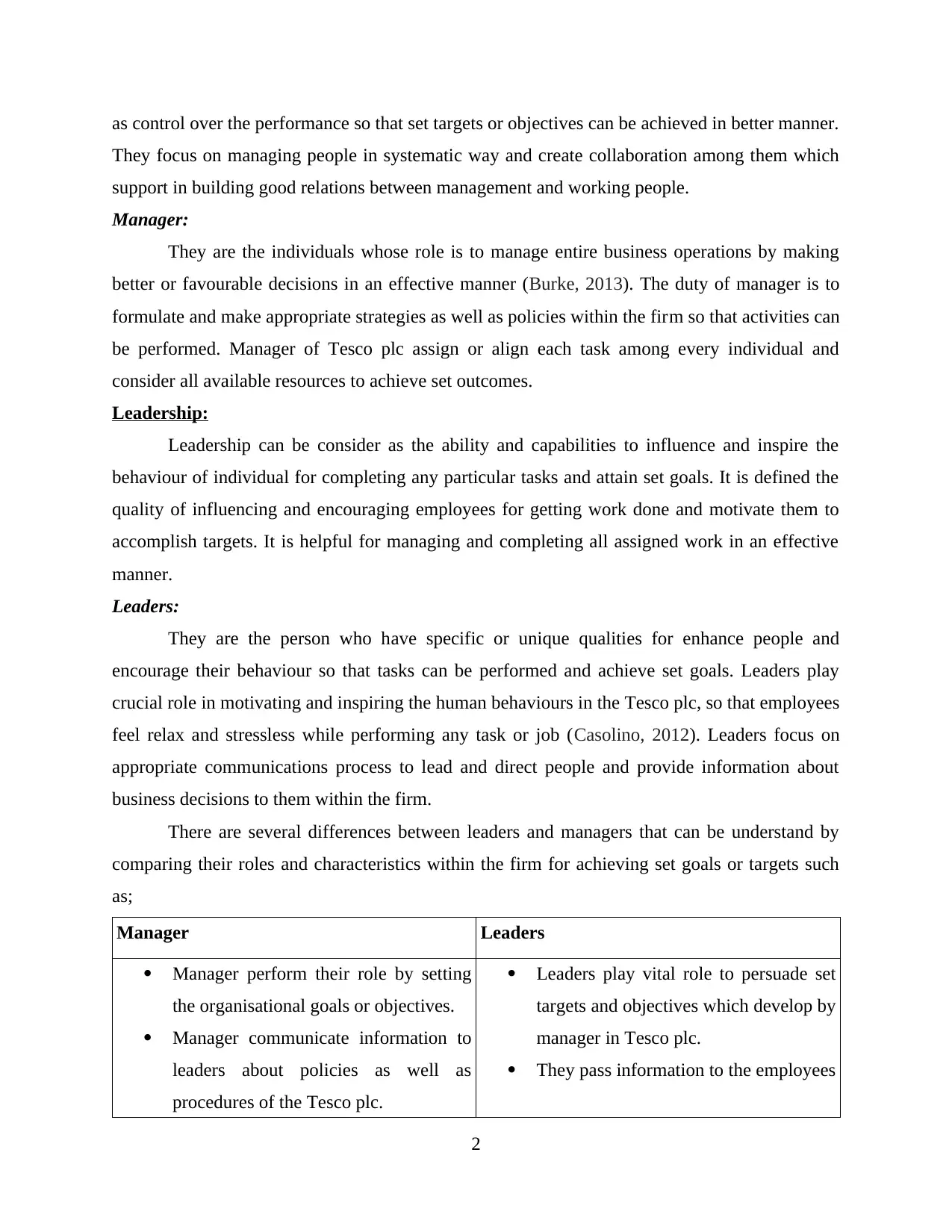
as control over the performance so that set targets or objectives can be achieved in better manner.
They focus on managing people in systematic way and create collaboration among them which
support in building good relations between management and working people.
Manager:
They are the individuals whose role is to manage entire business operations by making
better or favourable decisions in an effective manner (Burke, 2013). The duty of manager is to
formulate and make appropriate strategies as well as policies within the firm so that activities can
be performed. Manager of Tesco plc assign or align each task among every individual and
consider all available resources to achieve set outcomes.
Leadership:
Leadership can be consider as the ability and capabilities to influence and inspire the
behaviour of individual for completing any particular tasks and attain set goals. It is defined the
quality of influencing and encouraging employees for getting work done and motivate them to
accomplish targets. It is helpful for managing and completing all assigned work in an effective
manner.
Leaders:
They are the person who have specific or unique qualities for enhance people and
encourage their behaviour so that tasks can be performed and achieve set goals. Leaders play
crucial role in motivating and inspiring the human behaviours in the Tesco plc, so that employees
feel relax and stressless while performing any task or job (Casolino, 2012). Leaders focus on
appropriate communications process to lead and direct people and provide information about
business decisions to them within the firm.
There are several differences between leaders and managers that can be understand by
comparing their roles and characteristics within the firm for achieving set goals or targets such
as;
Manager Leaders
Manager perform their role by setting
the organisational goals or objectives.
Manager communicate information to
leaders about policies as well as
procedures of the Tesco plc.
Leaders play vital role to persuade set
targets and objectives which develop by
manager in Tesco plc.
They pass information to the employees
2
They focus on managing people in systematic way and create collaboration among them which
support in building good relations between management and working people.
Manager:
They are the individuals whose role is to manage entire business operations by making
better or favourable decisions in an effective manner (Burke, 2013). The duty of manager is to
formulate and make appropriate strategies as well as policies within the firm so that activities can
be performed. Manager of Tesco plc assign or align each task among every individual and
consider all available resources to achieve set outcomes.
Leadership:
Leadership can be consider as the ability and capabilities to influence and inspire the
behaviour of individual for completing any particular tasks and attain set goals. It is defined the
quality of influencing and encouraging employees for getting work done and motivate them to
accomplish targets. It is helpful for managing and completing all assigned work in an effective
manner.
Leaders:
They are the person who have specific or unique qualities for enhance people and
encourage their behaviour so that tasks can be performed and achieve set goals. Leaders play
crucial role in motivating and inspiring the human behaviours in the Tesco plc, so that employees
feel relax and stressless while performing any task or job (Casolino, 2012). Leaders focus on
appropriate communications process to lead and direct people and provide information about
business decisions to them within the firm.
There are several differences between leaders and managers that can be understand by
comparing their roles and characteristics within the firm for achieving set goals or targets such
as;
Manager Leaders
Manager perform their role by setting
the organisational goals or objectives.
Manager communicate information to
leaders about policies as well as
procedures of the Tesco plc.
Leaders play vital role to persuade set
targets and objectives which develop by
manager in Tesco plc.
They pass information to the employees
2
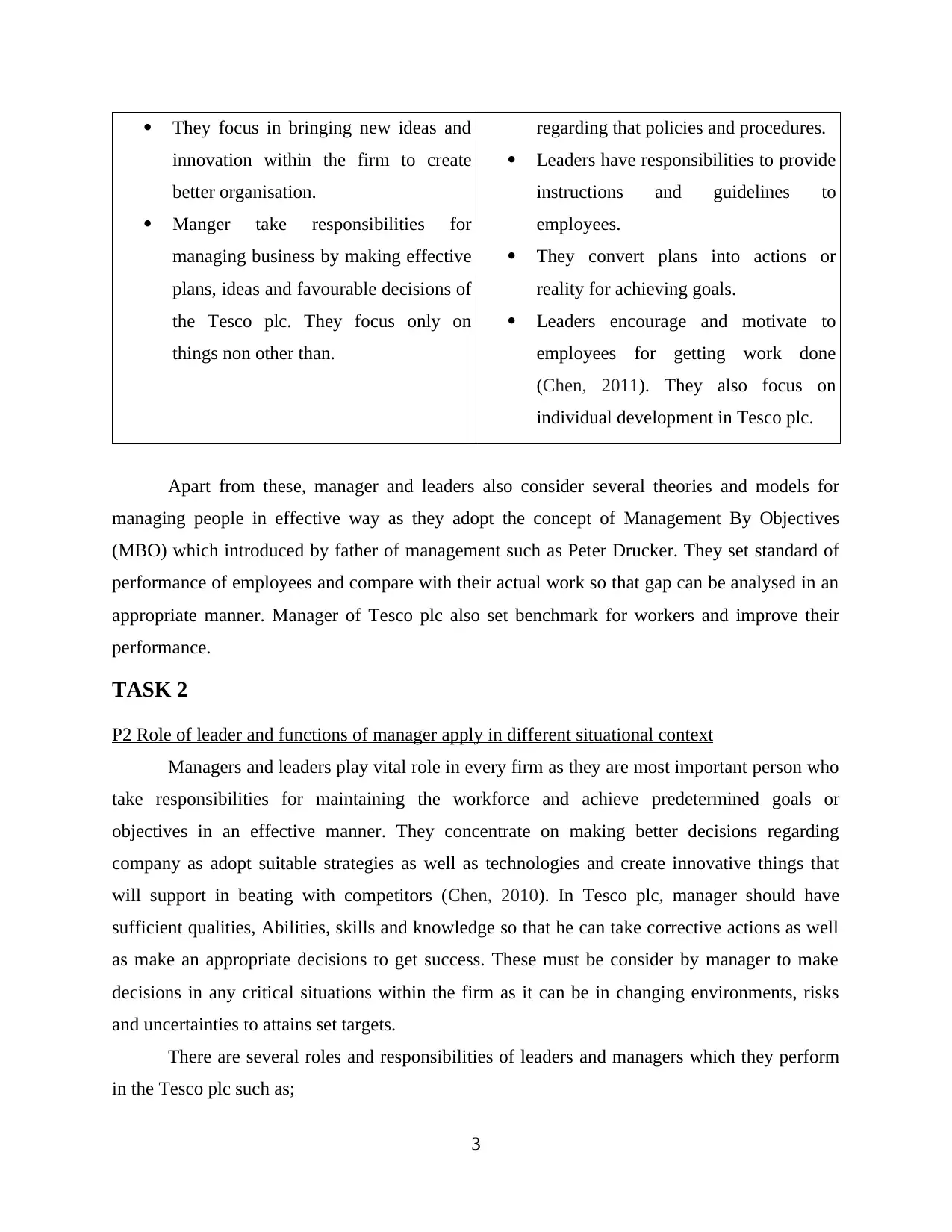
They focus in bringing new ideas and
innovation within the firm to create
better organisation.
Manger take responsibilities for
managing business by making effective
plans, ideas and favourable decisions of
the Tesco plc. They focus only on
things non other than.
regarding that policies and procedures.
Leaders have responsibilities to provide
instructions and guidelines to
employees.
They convert plans into actions or
reality for achieving goals.
Leaders encourage and motivate to
employees for getting work done
(Chen, 2011). They also focus on
individual development in Tesco plc.
Apart from these, manager and leaders also consider several theories and models for
managing people in effective way as they adopt the concept of Management By Objectives
(MBO) which introduced by father of management such as Peter Drucker. They set standard of
performance of employees and compare with their actual work so that gap can be analysed in an
appropriate manner. Manager of Tesco plc also set benchmark for workers and improve their
performance.
TASK 2
P2 Role of leader and functions of manager apply in different situational context
Managers and leaders play vital role in every firm as they are most important person who
take responsibilities for maintaining the workforce and achieve predetermined goals or
objectives in an effective manner. They concentrate on making better decisions regarding
company as adopt suitable strategies as well as technologies and create innovative things that
will support in beating with competitors (Chen, 2010). In Tesco plc, manager should have
sufficient qualities, Abilities, skills and knowledge so that he can take corrective actions as well
as make an appropriate decisions to get success. These must be consider by manager to make
decisions in any critical situations within the firm as it can be in changing environments, risks
and uncertainties to attains set targets.
There are several roles and responsibilities of leaders and managers which they perform
in the Tesco plc such as;
3
innovation within the firm to create
better organisation.
Manger take responsibilities for
managing business by making effective
plans, ideas and favourable decisions of
the Tesco plc. They focus only on
things non other than.
regarding that policies and procedures.
Leaders have responsibilities to provide
instructions and guidelines to
employees.
They convert plans into actions or
reality for achieving goals.
Leaders encourage and motivate to
employees for getting work done
(Chen, 2011). They also focus on
individual development in Tesco plc.
Apart from these, manager and leaders also consider several theories and models for
managing people in effective way as they adopt the concept of Management By Objectives
(MBO) which introduced by father of management such as Peter Drucker. They set standard of
performance of employees and compare with their actual work so that gap can be analysed in an
appropriate manner. Manager of Tesco plc also set benchmark for workers and improve their
performance.
TASK 2
P2 Role of leader and functions of manager apply in different situational context
Managers and leaders play vital role in every firm as they are most important person who
take responsibilities for maintaining the workforce and achieve predetermined goals or
objectives in an effective manner. They concentrate on making better decisions regarding
company as adopt suitable strategies as well as technologies and create innovative things that
will support in beating with competitors (Chen, 2010). In Tesco plc, manager should have
sufficient qualities, Abilities, skills and knowledge so that he can take corrective actions as well
as make an appropriate decisions to get success. These must be consider by manager to make
decisions in any critical situations within the firm as it can be in changing environments, risks
and uncertainties to attains set targets.
There are several roles and responsibilities of leaders and managers which they perform
in the Tesco plc such as;
3
⊘ This is a preview!⊘
Do you want full access?
Subscribe today to unlock all pages.

Trusted by 1+ million students worldwide
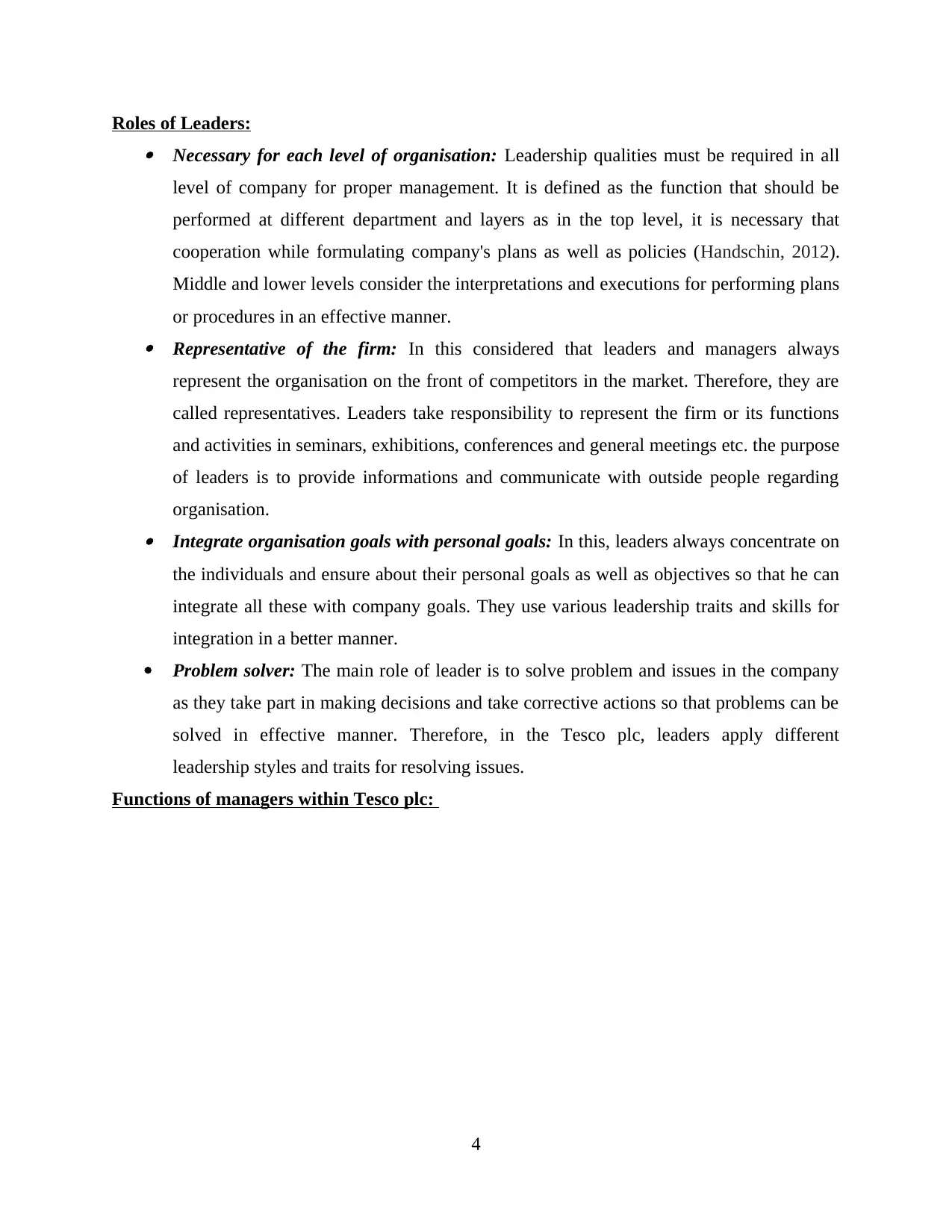
Roles of Leaders: Necessary for each level of organisation: Leadership qualities must be required in all
level of company for proper management. It is defined as the function that should be
performed at different department and layers as in the top level, it is necessary that
cooperation while formulating company's plans as well as policies (Handschin, 2012).
Middle and lower levels consider the interpretations and executions for performing plans
or procedures in an effective manner. Representative of the firm: In this considered that leaders and managers always
represent the organisation on the front of competitors in the market. Therefore, they are
called representatives. Leaders take responsibility to represent the firm or its functions
and activities in seminars, exhibitions, conferences and general meetings etc. the purpose
of leaders is to provide informations and communicate with outside people regarding
organisation. Integrate organisation goals with personal goals: In this, leaders always concentrate on
the individuals and ensure about their personal goals as well as objectives so that he can
integrate all these with company goals. They use various leadership traits and skills for
integration in a better manner.
Problem solver: The main role of leader is to solve problem and issues in the company
as they take part in making decisions and take corrective actions so that problems can be
solved in effective manner. Therefore, in the Tesco plc, leaders apply different
leadership styles and traits for resolving issues.
Functions of managers within Tesco plc:
4
level of company for proper management. It is defined as the function that should be
performed at different department and layers as in the top level, it is necessary that
cooperation while formulating company's plans as well as policies (Handschin, 2012).
Middle and lower levels consider the interpretations and executions for performing plans
or procedures in an effective manner. Representative of the firm: In this considered that leaders and managers always
represent the organisation on the front of competitors in the market. Therefore, they are
called representatives. Leaders take responsibility to represent the firm or its functions
and activities in seminars, exhibitions, conferences and general meetings etc. the purpose
of leaders is to provide informations and communicate with outside people regarding
organisation. Integrate organisation goals with personal goals: In this, leaders always concentrate on
the individuals and ensure about their personal goals as well as objectives so that he can
integrate all these with company goals. They use various leadership traits and skills for
integration in a better manner.
Problem solver: The main role of leader is to solve problem and issues in the company
as they take part in making decisions and take corrective actions so that problems can be
solved in effective manner. Therefore, in the Tesco plc, leaders apply different
leadership styles and traits for resolving issues.
Functions of managers within Tesco plc:
4
Paraphrase This Document
Need a fresh take? Get an instant paraphrase of this document with our AI Paraphraser
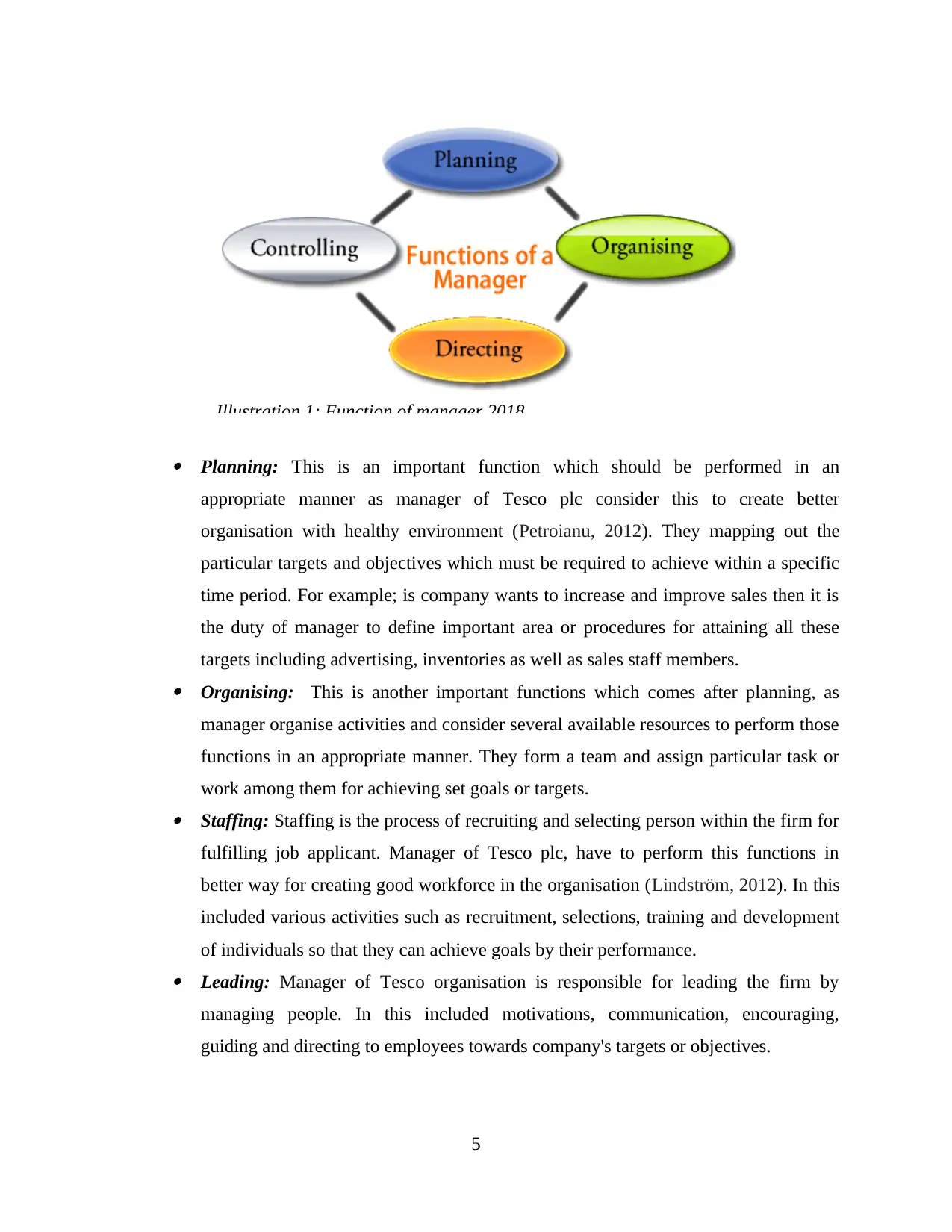
Planning: This is an important function which should be performed in an
appropriate manner as manager of Tesco plc consider this to create better
organisation with healthy environment (Petroianu, 2012). They mapping out the
particular targets and objectives which must be required to achieve within a specific
time period. For example; is company wants to increase and improve sales then it is
the duty of manager to define important area or procedures for attaining all these
targets including advertising, inventories as well as sales staff members.
Organising: This is another important functions which comes after planning, as
manager organise activities and consider several available resources to perform those
functions in an appropriate manner. They form a team and assign particular task or
work among them for achieving set goals or targets.
Staffing: Staffing is the process of recruiting and selecting person within the firm for
fulfilling job applicant. Manager of Tesco plc, have to perform this functions in
better way for creating good workforce in the organisation (Lindström, 2012). In this
included various activities such as recruitment, selections, training and development
of individuals so that they can achieve goals by their performance.
Leading: Manager of Tesco organisation is responsible for leading the firm by
managing people. In this included motivations, communication, encouraging,
guiding and directing to employees towards company's targets or objectives.
5
Illustration 1: Function of manager 2018
appropriate manner as manager of Tesco plc consider this to create better
organisation with healthy environment (Petroianu, 2012). They mapping out the
particular targets and objectives which must be required to achieve within a specific
time period. For example; is company wants to increase and improve sales then it is
the duty of manager to define important area or procedures for attaining all these
targets including advertising, inventories as well as sales staff members.
Organising: This is another important functions which comes after planning, as
manager organise activities and consider several available resources to perform those
functions in an appropriate manner. They form a team and assign particular task or
work among them for achieving set goals or targets.
Staffing: Staffing is the process of recruiting and selecting person within the firm for
fulfilling job applicant. Manager of Tesco plc, have to perform this functions in
better way for creating good workforce in the organisation (Lindström, 2012). In this
included various activities such as recruitment, selections, training and development
of individuals so that they can achieve goals by their performance.
Leading: Manager of Tesco organisation is responsible for leading the firm by
managing people. In this included motivations, communication, encouraging,
guiding and directing to employees towards company's targets or objectives.
5
Illustration 1: Function of manager 2018
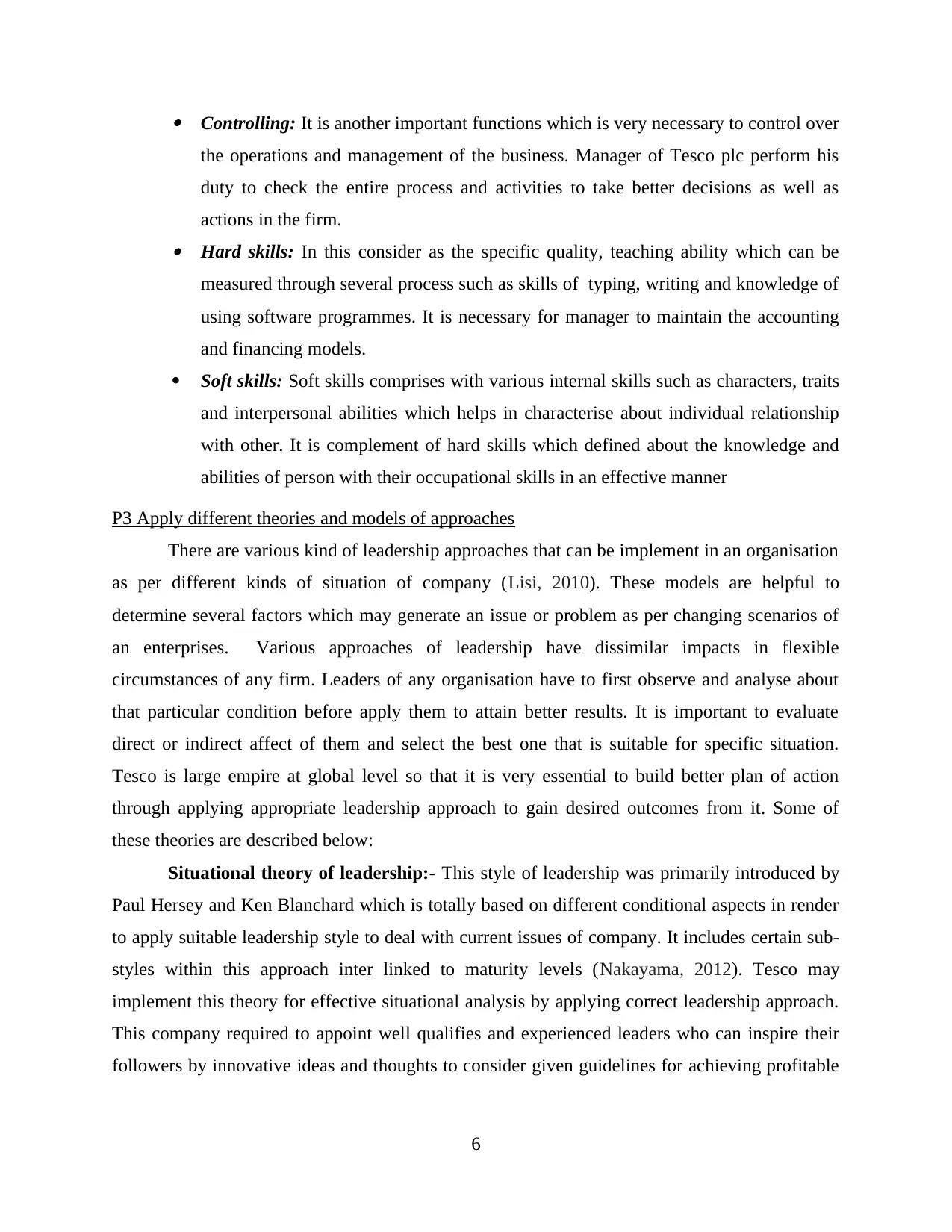
Controlling: It is another important functions which is very necessary to control over
the operations and management of the business. Manager of Tesco plc perform his
duty to check the entire process and activities to take better decisions as well as
actions in the firm.
Hard skills: In this consider as the specific quality, teaching ability which can be
measured through several process such as skills of typing, writing and knowledge of
using software programmes. It is necessary for manager to maintain the accounting
and financing models.
Soft skills: Soft skills comprises with various internal skills such as characters, traits
and interpersonal abilities which helps in characterise about individual relationship
with other. It is complement of hard skills which defined about the knowledge and
abilities of person with their occupational skills in an effective manner
P3 Apply different theories and models of approaches
There are various kind of leadership approaches that can be implement in an organisation
as per different kinds of situation of company (Lisi, 2010). These models are helpful to
determine several factors which may generate an issue or problem as per changing scenarios of
an enterprises. Various approaches of leadership have dissimilar impacts in flexible
circumstances of any firm. Leaders of any organisation have to first observe and analyse about
that particular condition before apply them to attain better results. It is important to evaluate
direct or indirect affect of them and select the best one that is suitable for specific situation.
Tesco is large empire at global level so that it is very essential to build better plan of action
through applying appropriate leadership approach to gain desired outcomes from it. Some of
these theories are described below:
Situational theory of leadership:- This style of leadership was primarily introduced by
Paul Hersey and Ken Blanchard which is totally based on different conditional aspects in render
to apply suitable leadership style to deal with current issues of company. It includes certain sub-
styles within this approach inter linked to maturity levels (Nakayama, 2012). Tesco may
implement this theory for effective situational analysis by applying correct leadership approach.
This company required to appoint well qualifies and experienced leaders who can inspire their
followers by innovative ideas and thoughts to consider given guidelines for achieving profitable
6
the operations and management of the business. Manager of Tesco plc perform his
duty to check the entire process and activities to take better decisions as well as
actions in the firm.
Hard skills: In this consider as the specific quality, teaching ability which can be
measured through several process such as skills of typing, writing and knowledge of
using software programmes. It is necessary for manager to maintain the accounting
and financing models.
Soft skills: Soft skills comprises with various internal skills such as characters, traits
and interpersonal abilities which helps in characterise about individual relationship
with other. It is complement of hard skills which defined about the knowledge and
abilities of person with their occupational skills in an effective manner
P3 Apply different theories and models of approaches
There are various kind of leadership approaches that can be implement in an organisation
as per different kinds of situation of company (Lisi, 2010). These models are helpful to
determine several factors which may generate an issue or problem as per changing scenarios of
an enterprises. Various approaches of leadership have dissimilar impacts in flexible
circumstances of any firm. Leaders of any organisation have to first observe and analyse about
that particular condition before apply them to attain better results. It is important to evaluate
direct or indirect affect of them and select the best one that is suitable for specific situation.
Tesco is large empire at global level so that it is very essential to build better plan of action
through applying appropriate leadership approach to gain desired outcomes from it. Some of
these theories are described below:
Situational theory of leadership:- This style of leadership was primarily introduced by
Paul Hersey and Ken Blanchard which is totally based on different conditional aspects in render
to apply suitable leadership style to deal with current issues of company. It includes certain sub-
styles within this approach inter linked to maturity levels (Nakayama, 2012). Tesco may
implement this theory for effective situational analysis by applying correct leadership approach.
This company required to appoint well qualifies and experienced leaders who can inspire their
followers by innovative ideas and thoughts to consider given guidelines for achieving profitable
6
⊘ This is a preview!⊘
Do you want full access?
Subscribe today to unlock all pages.

Trusted by 1+ million students worldwide
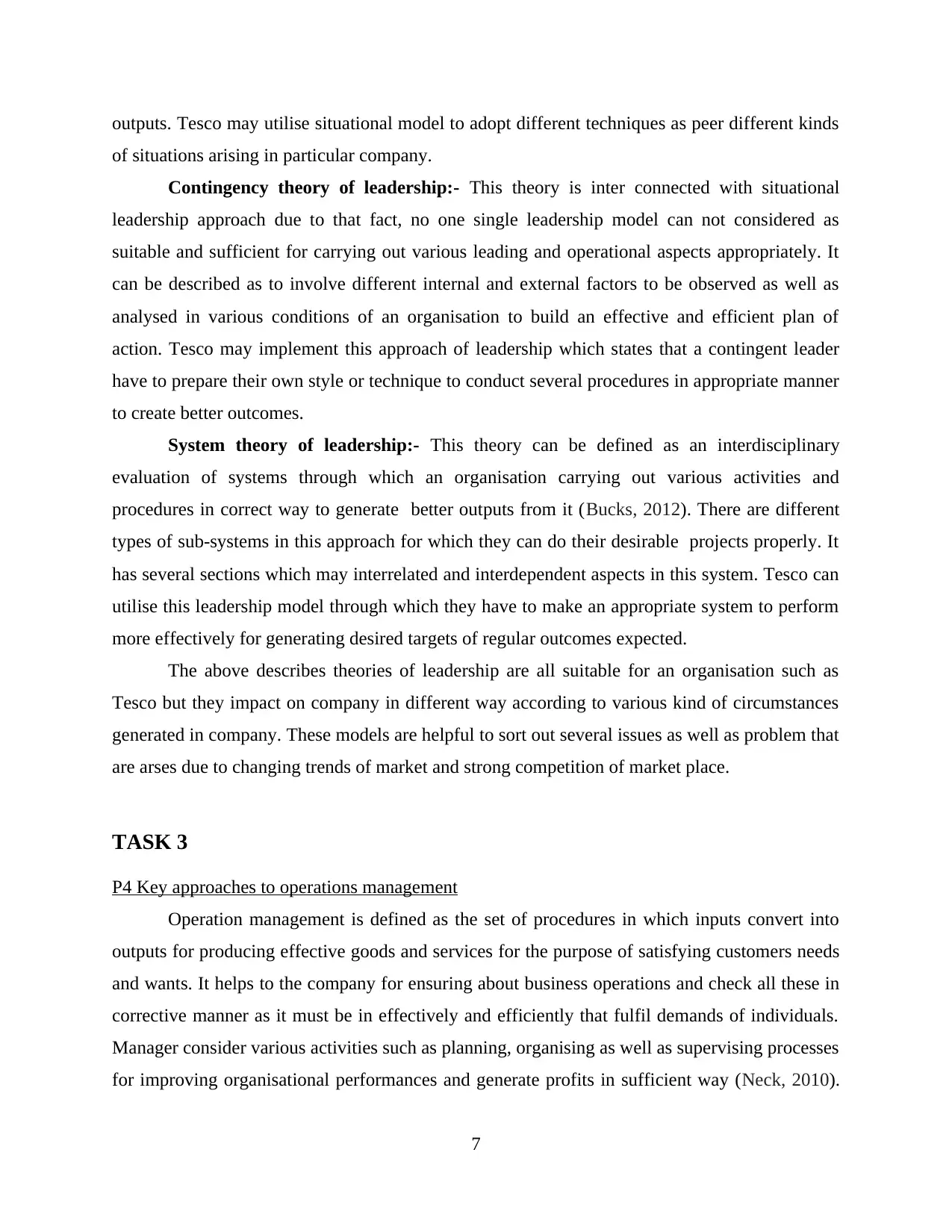
outputs. Tesco may utilise situational model to adopt different techniques as peer different kinds
of situations arising in particular company.
Contingency theory of leadership:- This theory is inter connected with situational
leadership approach due to that fact, no one single leadership model can not considered as
suitable and sufficient for carrying out various leading and operational aspects appropriately. It
can be described as to involve different internal and external factors to be observed as well as
analysed in various conditions of an organisation to build an effective and efficient plan of
action. Tesco may implement this approach of leadership which states that a contingent leader
have to prepare their own style or technique to conduct several procedures in appropriate manner
to create better outcomes.
System theory of leadership:- This theory can be defined as an interdisciplinary
evaluation of systems through which an organisation carrying out various activities and
procedures in correct way to generate better outputs from it (Bucks, 2012). There are different
types of sub-systems in this approach for which they can do their desirable projects properly. It
has several sections which may interrelated and interdependent aspects in this system. Tesco can
utilise this leadership model through which they have to make an appropriate system to perform
more effectively for generating desired targets of regular outcomes expected.
The above describes theories of leadership are all suitable for an organisation such as
Tesco but they impact on company in different way according to various kind of circumstances
generated in company. These models are helpful to sort out several issues as well as problem that
are arses due to changing trends of market and strong competition of market place.
TASK 3
P4 Key approaches to operations management
Operation management is defined as the set of procedures in which inputs convert into
outputs for producing effective goods and services for the purpose of satisfying customers needs
and wants. It helps to the company for ensuring about business operations and check all these in
corrective manner as it must be in effectively and efficiently that fulfil demands of individuals.
Manager consider various activities such as planning, organising as well as supervising processes
for improving organisational performances and generate profits in sufficient way (Neck, 2010).
7
of situations arising in particular company.
Contingency theory of leadership:- This theory is inter connected with situational
leadership approach due to that fact, no one single leadership model can not considered as
suitable and sufficient for carrying out various leading and operational aspects appropriately. It
can be described as to involve different internal and external factors to be observed as well as
analysed in various conditions of an organisation to build an effective and efficient plan of
action. Tesco may implement this approach of leadership which states that a contingent leader
have to prepare their own style or technique to conduct several procedures in appropriate manner
to create better outcomes.
System theory of leadership:- This theory can be defined as an interdisciplinary
evaluation of systems through which an organisation carrying out various activities and
procedures in correct way to generate better outputs from it (Bucks, 2012). There are different
types of sub-systems in this approach for which they can do their desirable projects properly. It
has several sections which may interrelated and interdependent aspects in this system. Tesco can
utilise this leadership model through which they have to make an appropriate system to perform
more effectively for generating desired targets of regular outcomes expected.
The above describes theories of leadership are all suitable for an organisation such as
Tesco but they impact on company in different way according to various kind of circumstances
generated in company. These models are helpful to sort out several issues as well as problem that
are arses due to changing trends of market and strong competition of market place.
TASK 3
P4 Key approaches to operations management
Operation management is defined as the set of procedures in which inputs convert into
outputs for producing effective goods and services for the purpose of satisfying customers needs
and wants. It helps to the company for ensuring about business operations and check all these in
corrective manner as it must be in effectively and efficiently that fulfil demands of individuals.
Manager consider various activities such as planning, organising as well as supervising processes
for improving organisational performances and generate profits in sufficient way (Neck, 2010).
7
Paraphrase This Document
Need a fresh take? Get an instant paraphrase of this document with our AI Paraphraser
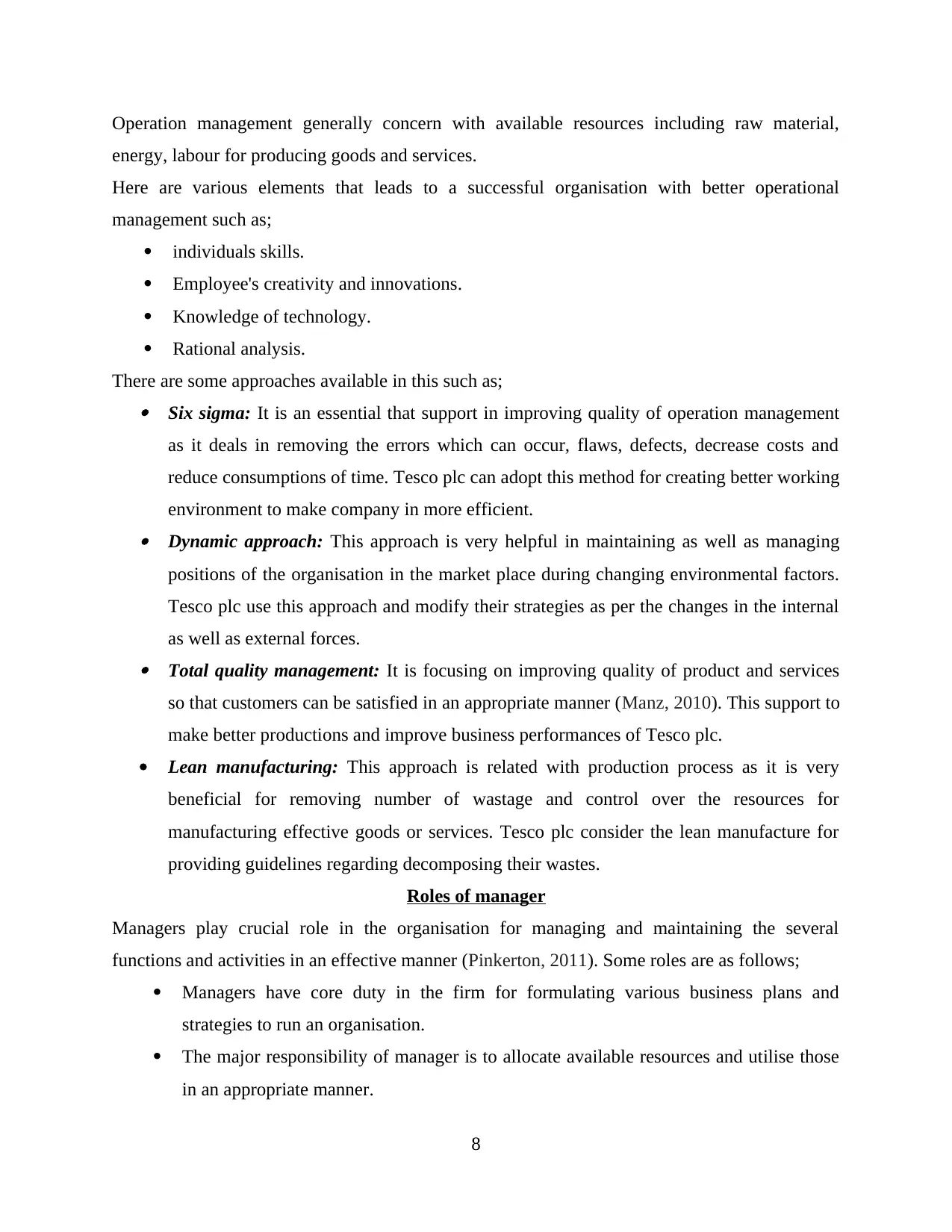
Operation management generally concern with available resources including raw material,
energy, labour for producing goods and services.
Here are various elements that leads to a successful organisation with better operational
management such as;
individuals skills.
Employee's creativity and innovations.
Knowledge of technology.
Rational analysis.
There are some approaches available in this such as; Six sigma: It is an essential that support in improving quality of operation management
as it deals in removing the errors which can occur, flaws, defects, decrease costs and
reduce consumptions of time. Tesco plc can adopt this method for creating better working
environment to make company in more efficient. Dynamic approach: This approach is very helpful in maintaining as well as managing
positions of the organisation in the market place during changing environmental factors.
Tesco plc use this approach and modify their strategies as per the changes in the internal
as well as external forces. Total quality management: It is focusing on improving quality of product and services
so that customers can be satisfied in an appropriate manner (Manz, 2010). This support to
make better productions and improve business performances of Tesco plc.
Lean manufacturing: This approach is related with production process as it is very
beneficial for removing number of wastage and control over the resources for
manufacturing effective goods or services. Tesco plc consider the lean manufacture for
providing guidelines regarding decomposing their wastes.
Roles of manager
Managers play crucial role in the organisation for managing and maintaining the several
functions and activities in an effective manner (Pinkerton, 2011). Some roles are as follows;
Managers have core duty in the firm for formulating various business plans and
strategies to run an organisation.
The major responsibility of manager is to allocate available resources and utilise those
in an appropriate manner.
8
energy, labour for producing goods and services.
Here are various elements that leads to a successful organisation with better operational
management such as;
individuals skills.
Employee's creativity and innovations.
Knowledge of technology.
Rational analysis.
There are some approaches available in this such as; Six sigma: It is an essential that support in improving quality of operation management
as it deals in removing the errors which can occur, flaws, defects, decrease costs and
reduce consumptions of time. Tesco plc can adopt this method for creating better working
environment to make company in more efficient. Dynamic approach: This approach is very helpful in maintaining as well as managing
positions of the organisation in the market place during changing environmental factors.
Tesco plc use this approach and modify their strategies as per the changes in the internal
as well as external forces. Total quality management: It is focusing on improving quality of product and services
so that customers can be satisfied in an appropriate manner (Manz, 2010). This support to
make better productions and improve business performances of Tesco plc.
Lean manufacturing: This approach is related with production process as it is very
beneficial for removing number of wastage and control over the resources for
manufacturing effective goods or services. Tesco plc consider the lean manufacture for
providing guidelines regarding decomposing their wastes.
Roles of manager
Managers play crucial role in the organisation for managing and maintaining the several
functions and activities in an effective manner (Pinkerton, 2011). Some roles are as follows;
Managers have core duty in the firm for formulating various business plans and
strategies to run an organisation.
The major responsibility of manager is to allocate available resources and utilise those
in an appropriate manner.
8
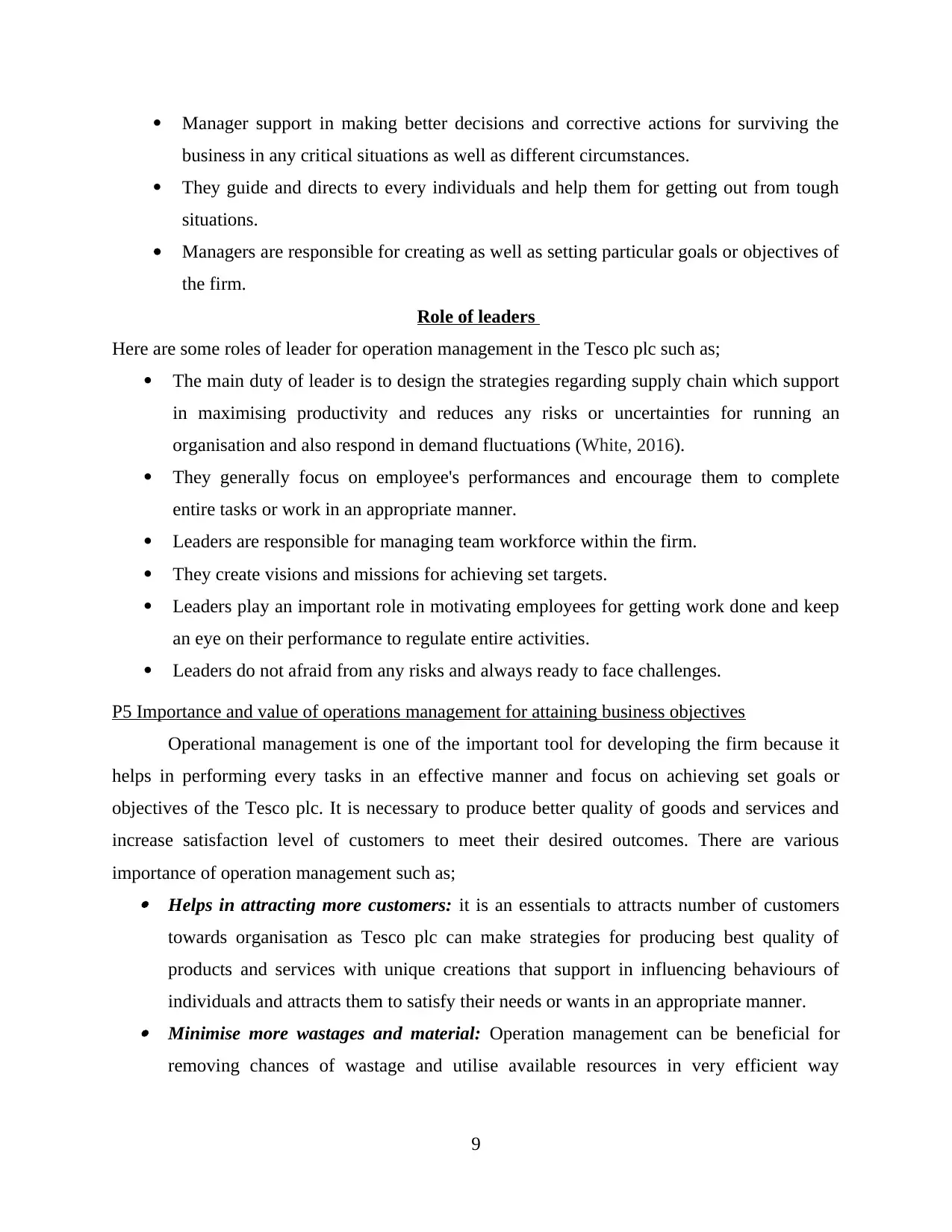
Manager support in making better decisions and corrective actions for surviving the
business in any critical situations as well as different circumstances.
They guide and directs to every individuals and help them for getting out from tough
situations.
Managers are responsible for creating as well as setting particular goals or objectives of
the firm.
Role of leaders
Here are some roles of leader for operation management in the Tesco plc such as;
The main duty of leader is to design the strategies regarding supply chain which support
in maximising productivity and reduces any risks or uncertainties for running an
organisation and also respond in demand fluctuations (White, 2016).
They generally focus on employee's performances and encourage them to complete
entire tasks or work in an appropriate manner.
Leaders are responsible for managing team workforce within the firm.
They create visions and missions for achieving set targets.
Leaders play an important role in motivating employees for getting work done and keep
an eye on their performance to regulate entire activities.
Leaders do not afraid from any risks and always ready to face challenges.
P5 Importance and value of operations management for attaining business objectives
Operational management is one of the important tool for developing the firm because it
helps in performing every tasks in an effective manner and focus on achieving set goals or
objectives of the Tesco plc. It is necessary to produce better quality of goods and services and
increase satisfaction level of customers to meet their desired outcomes. There are various
importance of operation management such as; Helps in attracting more customers: it is an essentials to attracts number of customers
towards organisation as Tesco plc can make strategies for producing best quality of
products and services with unique creations that support in influencing behaviours of
individuals and attracts them to satisfy their needs or wants in an appropriate manner. Minimise more wastages and material: Operation management can be beneficial for
removing chances of wastage and utilise available resources in very efficient way
9
business in any critical situations as well as different circumstances.
They guide and directs to every individuals and help them for getting out from tough
situations.
Managers are responsible for creating as well as setting particular goals or objectives of
the firm.
Role of leaders
Here are some roles of leader for operation management in the Tesco plc such as;
The main duty of leader is to design the strategies regarding supply chain which support
in maximising productivity and reduces any risks or uncertainties for running an
organisation and also respond in demand fluctuations (White, 2016).
They generally focus on employee's performances and encourage them to complete
entire tasks or work in an appropriate manner.
Leaders are responsible for managing team workforce within the firm.
They create visions and missions for achieving set targets.
Leaders play an important role in motivating employees for getting work done and keep
an eye on their performance to regulate entire activities.
Leaders do not afraid from any risks and always ready to face challenges.
P5 Importance and value of operations management for attaining business objectives
Operational management is one of the important tool for developing the firm because it
helps in performing every tasks in an effective manner and focus on achieving set goals or
objectives of the Tesco plc. It is necessary to produce better quality of goods and services and
increase satisfaction level of customers to meet their desired outcomes. There are various
importance of operation management such as; Helps in attracting more customers: it is an essentials to attracts number of customers
towards organisation as Tesco plc can make strategies for producing best quality of
products and services with unique creations that support in influencing behaviours of
individuals and attracts them to satisfy their needs or wants in an appropriate manner. Minimise more wastages and material: Operation management can be beneficial for
removing chances of wastage and utilise available resources in very efficient way
9
⊘ This is a preview!⊘
Do you want full access?
Subscribe today to unlock all pages.

Trusted by 1+ million students worldwide
1 out of 16
Related Documents
Your All-in-One AI-Powered Toolkit for Academic Success.
+13062052269
info@desklib.com
Available 24*7 on WhatsApp / Email
![[object Object]](/_next/static/media/star-bottom.7253800d.svg)
Unlock your academic potential
Copyright © 2020–2026 A2Z Services. All Rights Reserved. Developed and managed by ZUCOL.





